Annabel Lim is championing climate change, one tree at a time. As a Research Assistant at the Centre for Nature-based Climate Solutions (CNCS), the NUS Life Sciences graduate with a minor in Communications and New Media is now part of a team creating a near-real-time map of carbon stocks in Southeast Asia.
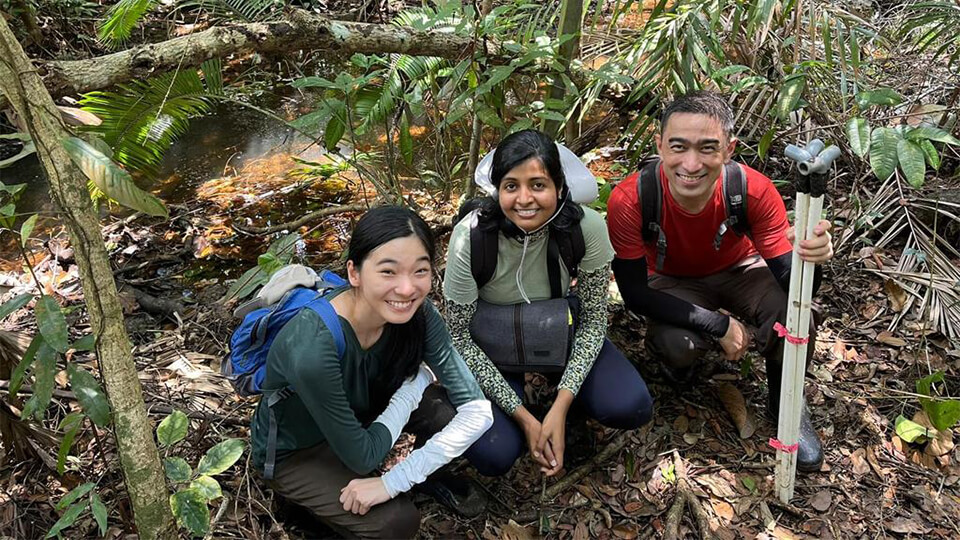 Annabel (first from left) conducted fieldwork at Nee Soon Swamp Forest with Dr Manjari Jayathilake and Mr Jose Don De Alban from CNCS.
Annabel (first from left) conducted fieldwork at Nee Soon Swamp Forest with Dr Manjari Jayathilake and Mr Jose Don De Alban from CNCS.
Going back to her roots
Annabel’s dedication to restoring the environment and helping the planet heal its wounds started blooming when she was just aged six. The verdant tropical forests and vibrant coral reefs she observed on her family’s visits to their relatives in North Borneo were the perfect playground for the young naturalist.
From one trip to the next, she was struck by how much of nature’s precious beauty was being lost.
"Coral reefs that were once colourful were becoming bleached," Annabel laments. "Forests that were once lush havens for wildlife had transformed into oil palm plantations as far as the eye can see."
By the time Annabel was in secondary school, she was determined to make a difference. The next step was to acquire the skills needed for the battle ahead — and she saw the golden opportunity to do so by enrolling in NUS Life Sciences.
Branching out
What drew Annabel to NUS Life Sciences was its assortment of interdisciplinary courses, which empowers students to employ new knowledge outside the bubble of their primary major. This meant that Annabel and her classmates were able to make transdisciplinary connections, applying what they had learnt about computing, sociology and geography to their native field of environmental science. Annabel said the flexibility provided was something she found most appealing. “One thing that attracted me to the major is the fact that it didn’t lock us into a specific career path, but rather opened our eyes to many doors we might’ve missed,” she enthuses.
In addition, while Annabel expected to have an intensive academic experience at NUS, with endless journal articles to read and reports to write, she was pleasantly surprised by the hands-on approach to learning she got to experience from the lecture hall to the lab.
“It turned out to be delightfully different and I’m glad for it, because honestly, (rote memorisation is) not my style of learning and I would’ve had a hard time if that was the case. The whole curriculum was designed to be engaging instead of forcing us to swallow information.”
Annabel fondly recalls the myriad creative assignments she worked on. For one such assignment, she wrote a choice-based narrative adventure game in Twine, aimed at educating the public about the woefully understudied Kingdom of the Fungi. Players solved puzzles while learning about the many uses of fungi, ranging from breaking down pollutants to rejuvenating crops. In another assignment, she made a brochure filled with trivia on intertidal species that called for the protection of Singapore’s shorelines.
“That was really fun because they encouraged you to add an original and artistic flavour to it,” she recalls.
The department’s integrated approach does not end with simply injecting creativity into the syllabus. Annabel is also grateful for its practical and technical lessons.
“One of the most important courses that I took was Applied Data Analysis which taught us ‘R’: a programming language extremely helpful for ecological statistical analysis and modelling. It’s holistic in the sense that you’re learning about ecology, statistics and programming at the same time.”
The ‘R’ course, along with a class she had taken on a different language, Python, sparked an interest in coding Annabel didn’t even know she had, and propelled her to further pick up JavaScript. Today, the three languages are among the foremost tools enabling her research.
Sprucing up her skills
Annabel’s university journey would not have been complete without her participation in the Special Programme in Science (SPS), a multidisciplinary programme that promotes peer-learning and mentorship among Science students.
“It was really refreshing to collaborate with students from other majors — students who don't think exactly the way you think. It definitely broadened my perspective.”
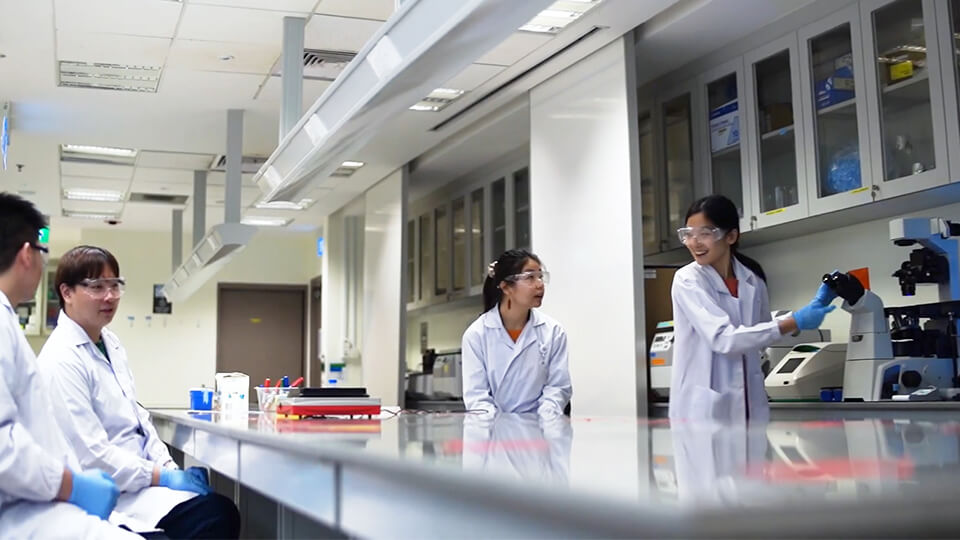 Annabel (first from right) was Head Mentor in the SPS programme.
Annabel (first from right) was Head Mentor in the SPS programme.
Under the SPS programme, Annabel and her peers could hone their arsenal of research skills. The cornerstone research opportunity that SPS offers is the Integrated Science Project, which is typically carried out in the first semester of Year 2. Annabel’s group embarked on a series of exploratory studies in eco-friendly antifouling solutions and the purification of active enzymes from marine soft tissue. For their diligence and innovativeness, they received the EXPLORE! Young Marine Scientist Research Award.
Annabel also discovered that SPS allowed her to try her hand at science communication and outreach. One of her fondest memories is when SPS participated in the Pint of Science festival, and she got to design fun-filled experiments for the public to try their hand at.
Given the immense growth Annabel experienced under SPS, it is no wonder she was keen to step into the role of Head Mentor, so that she could contribute back to the community that had helped her, and be a guiding light for future batches of SPS students.
“SPS has been more than just a programme for me. It has been a central part of my undergraduate years, a riveting voyage of scientific and self-discovery, as well as a second home.”
Planting the seeds of change
Inspired by the naturalist broadcaster Sir David Attenborough, Annabel poses a rhetorical question: “What’s the point of research if you can’t communicate that message to the public?”
She knew that if she was to effectively campaign for conservation, she had to raise awareness beyond academia and call for collective action in the wider community, skills that her minor in Communications and New Media equipped her with.
The Cultural Studies: Theory and Practice course taught Annabel critical concepts surrounding class conflicts, gender inequality and neo-colonialism. The presence of exchange students with their own unique sociocultural backgrounds and worldviews further guaranteed a vibrant and dynamic exchange of ideas.
“The minor turned out to be immensely useful for my work because a researcher needs to understand cultural context before recommending conservation plans,” Annabel says.
Barking up the right tree
In the field of Environmental Biology, one of three specialisations a Life Sciences student can choose from in Year 2, there are plenty of field work opportunities abroad in places such as Sri Lanka and Costa Rica, to name a few.
While Annabel was unable to capitalise on the overseas opportunities that NUS presented due to the COVID-19 pandemic, she remained undeterred. Though physically far removed from the Philippines, Annabel — armed with mathematics, spatial software and recently-developed algorithms — was able to carry out her thesis on conservation planning for the country’s vulnerable dipterocarp forests.
“I chose the Philippines specifically, because it’s facing extreme landscape change and timber exploitation (resulting in deforestation). The Philippines is predicted to be the worst hit by climate change in the region,” she notes.
Annabel managed to generate a map showing where new protected areas, if set up, could safeguard dipterocarp tree species under future climate change. The map balanced a slew of considerations in order to maximise benefit to biodiversity while ensuring locals’ livelihoods would not be jeopardised by the incursion of protected areas into farms or villages.
“Conservation is never just about the plants and animals; people are a vital component of the equation too.”
Taking her passion out of the classroom
No matter one’s cup of tea, there is probably an interest group for one to explore to the fullest at NUS. To optimise the NUS experience, Annabel advises future undergraduates to “pursue whatever strikes your fancy because you’ll never know whether that can blossom into something.”
As a strong proponent for the environment, it was only natural for Annabel to join the NUS Toddycats — a group focused on conservation, research and education — and the Environmental Biology Interest Group.
In both of these clubs, Annabel conducted nature walks, pointing out the different flora and fauna on display, and speaking about the interconnectedness of the wider ecosystem.
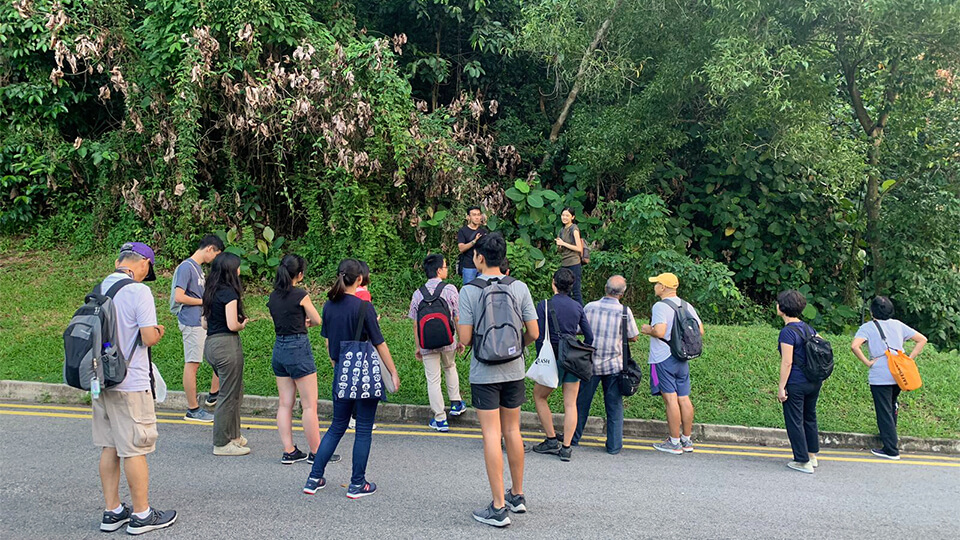 Annabel (last row, first from right) and fellow student Christopher John gave members of the public as well as NUS students and staff a guided nature walk around NUS’ Kent Ridge campus.
Annabel (last row, first from right) and fellow student Christopher John gave members of the public as well as NUS students and staff a guided nature walk around NUS’ Kent Ridge campus.
“We share anecdotes to get people to appreciate the wonders of nature and how each species is essential to the ecosystem,” she recounts.
Annabel also participated in the 2019 and 2020 EVBig Mangrove Cleanup. The event, which was part of the NUS Cares movement (previously known as NUS Day of Service), involved removing refuse from the shoreline, and was attended by NUS President Professor Tan Eng Chye, who highlighted the need for proper waste management.
"It's sad to see so much trash but it's a fun and unique experience to band together with a group of people, in the heart of a mangrove, with a common goal of doing good," Annabel reminisces.
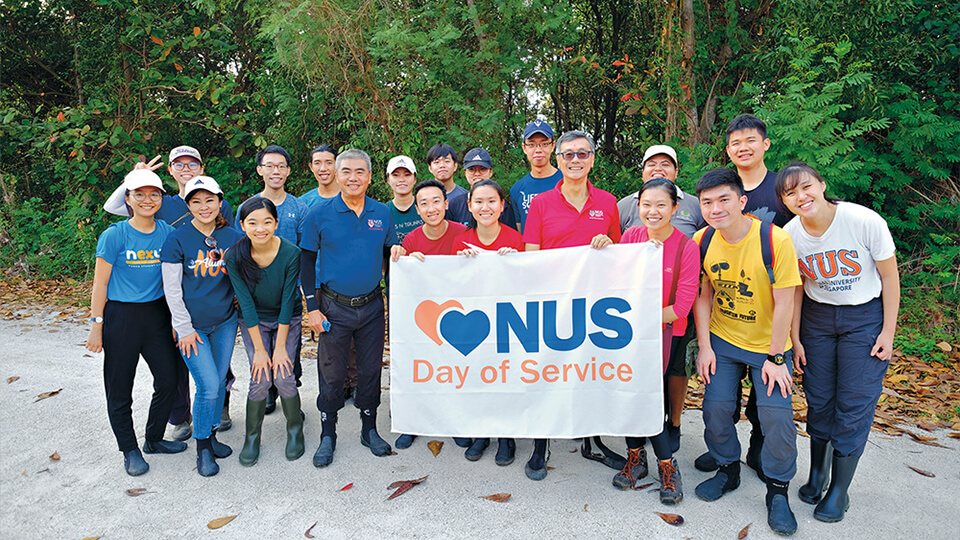 Annabel (first row, third from left) attended the NUS Day of Service 2019 EVBig Mangrove Cleanup, where NUS President Prof Tan Eng Chye (first row, fourth from right) was present.
Annabel (first row, third from left) attended the NUS Day of Service 2019 EVBig Mangrove Cleanup, where NUS President Prof Tan Eng Chye (first row, fourth from right) was present.
Leaf and learn
Her undergraduate odyssey concluded, Annabel is wasting no time making a difference while waiting for her PhD programme to commence. As part of her role at CNCS, Annabel is working on improving predictive models for carbon contained within the forests of Southeast Asia, where uncertainty surrounding values currently abound. Attaining more accurate carbon stock estimates will give carbon projects in the region greater integrity, increase investor confidence and motivate project funding via the carbon credit market.
“The hope is to create an alternative stream of income for the residents living in the forest so they don’t have to cut down trees to support themselves anymore,” Annabel explains.
When asked about her future endeavours, Annabel’s vision is clear: to leave the world a better place than she found it.
“Even if my contribution is just a drop in the ocean, I would want to be a part of the wave that brings about positive change in the world.”
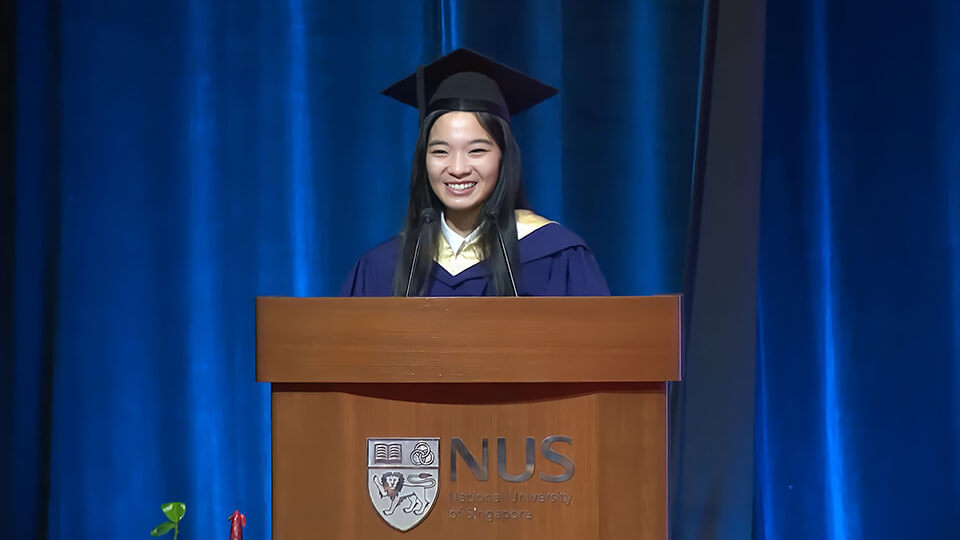 Annabel delivered the valedictory speech at Commencement 2022.
Annabel delivered the valedictory speech at Commencement 2022.